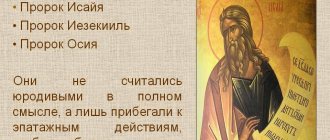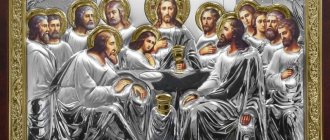In the Dictionary of Synonyms
demon, hypocritical, cunning, cunning; cunning, with a cunning, cunning, crooked, cunning like a fox, arapist, thieving, malicious, accursed, with a cunning, devilish, mischievous, roguish, swindling, on his own mind, devil, devil, devil, don’t put your finger in your mouth, Jesuitical, roguish, rascally, wobbling, evil spirit, insidious, demon, roguish, don’t put a finger in your mouth, playful, Machiavellian, unclean spirit, cunning, pursing, evil spirit, Machiavellian, Satan, feigned
The Evil One: Personification of Evil
Estimated reading time: 3 minutes.
The main Christian prayer is “Our Father.” It is also called the Lord’s Prayer, because it was dictated in the Gospel (Matt. 6:9-13; Luke 9:2-4) and Christ himself commanded to pray it.
It ends with a prayer to God: “And lead us not into temptation, but deliver us from the evil one.” It is interesting that in the Greek original of the Gospel the evil one is designated as πονηρός (ponēros), which translated into Russian means “bad”, “evil”, “bad”, “nasty”. That is, in this Greek word there are predominantly meanings of depravity, evil, badness, and not deceit and cunning, as in the Russian word. Also in the Latin version of the prayer (Paternoster) it says “but free us from evil (or from evil)”: Sed libera nos a malo.
In general, the word “Luka” in Russian means the bend of something, for example, a river (not to be confused with the name Luka of Greek origin). In a figurative sense, calling the devil evil indicates his moral crookedness and deceit.
However, in this sense, the word “evil” is not so different from the literal meaning of the Greek word “devil” - slanderer. Cunning and cunning, deceit are indispensable companions of slander.
It is also interesting that by “evil” or “evil” in prayer one can understand both the devil and evil as such, and then this word can be perceived simply as the adjective “evil” (or “evil”). And there is no contradiction or ambiguity in this. The point, in my opinion, is that Christianity is a religion of the individual and personal. In it, good and evil are not abstract, impersonal principles in the manner of higher philosophical categories. God as a Person, the only source of good and being, is also opposed by a person - the devil. Christ is opposed by the Antichrist.
(this Greek word is a play on words; it simultaneously means “the adversary of Christ” and “in place of Christ,” the one who took the place of Christ).
Indeed, without Christ and his recognition as God, no Christianity is possible, simply unthinkable. Therefore, for example, when they say that the main thing in Christianity is morality, morality, the student of goodness, this is the greatest mistake. Not just an emasculation of Christianity, but a rejection of it. Christianity is, of course, also a teaching about goodness, about how to live according to conscience. But the main source of this teaching, its bearer, is Christ. This idea was expressed in a deliberately paradoxical form by the great Russian writer F.M. Dostoevsky: “If somehow it turned out... that Christ is outside the truth and the truth is outside Christ, then I would prefer to remain with Christ outside the truth.”
Also, evil is not only an abstract category or just a general concept, it has a concrete carrier - the devil and the demons subordinate to him. Disbelief in them, in their real existence, also means a real rejection of Christianity.
Finally, I will quote the statements of John Chrysostom about the evil one from “Our Father”: “Christ here calls the devil evil, commanding us to wage irreconcilable warfare against him and showing that he is not such by nature. Evil does not depend on nature, but on freedom. And the fact that the devil is primarily called the evil one is due to the extraordinary amount of evil that is found in him, and because he, without being offended by anything from us, wages an irreconcilable battle against us. Therefore, the Savior did not say: “Deliver us from the evil ones,” but from the evil one, and thereby teaches us never to be angry with our neighbors for the insults that we sometimes suffer from them, but to turn all our enmity against the devil as the culprit of all angry."
At the announcement, a fragment of Fra Beato Angelico’s painting “The Last Judgment”
In the dictionary Complete accentuated paradigm according to A. A. Zaliznya
1 . wicked, wicked, wicked, wicked, wicked, wicked, wicked, wicked, wicked, wicked, wicked, wicked, wicked, wicked, wicked, wicked, wicked, wicked, wicked howl, wicked, crafty, crafty, crafty, crafty, crafty, crafty, crafty, crafty, crafty, crafty, crafty, crafty, crafty, crafty, half-cunning, crafty, half-cunning 2 . wicked, crafty, wicked, wicked, wicked, wicked, wicked, wicked, wicked, wicked, wicked, wicked
Share the meaning of the word:
Meaning
Let's start with the fact that if a person uses this word in its literal meaning, then it does not carry anything good. The evil one is:
- Unkind.
- The one who lies and deceives.
- Dishonest.
- Cunning, with a pebble in his bosom.
- Treacherous.
- Unholy.
But if we are talking about a figurative meaning. For example, a girl looks at a guy slyly. This does not mean at all that she is deceiving him, being cunning with him, or, to take it higher, that she is unfaithful to him. No, absolutely not. When a girl looks at a guy slyly, this is, on the contrary, a good sign, because such a look indicates the woman’s interest.
And in this context, the adjective “crafty” is playful.
But slyness in a good figurative sense can accompany relationships not only between lovers, but also between parents and children. When, for example, a child wants to surprise mom or dad and he doesn’t have enough composure to hide his intention. His eyes (which, as we know, are the mirror of the soul) sparkle when he thinks about how happy his parents will be when they receive a gift. The eyes glow mischievously. It is impossible to say more precisely.
Bow weapon'
The bow is one of the oldest types of weapons, used by almost all peoples. The Slavs gave the name to the object based on its appearance: bows, even without a taut string, have a curved shape, and to fire they need to be bent even more.
The dialects preserved the verb lukat 'throw, throw', formed from the noun bow, apparently back in the pre-Slavic era. A bow is a tool for throwing arrows, and, most likely, to bow at first only meant “to shoot from a bow.” Over time, the meaning of the verb expanded, it became possible to bow a variety of objects - without the help of a bow, just throw them with your hands. In some dialects and other Slavic languages, a similar verb means 'throw a stone with a sling'.
Proto-Slavic *lǫkъ was formed from the verb *lękti 'to bend, bend'. This verb has not been preserved in modern Slavic languages, and it would hardly have been possible to restore it without comparing Slavic words with Baltic ones. In Lithuanian, the etymology of the noun lankas 'onion; arc, hoop' is quite transparent: this word, related to our bow, is derived from the verb leñkti 'to bend'. And the Lithuanian adjective lankus means 'flexible'. Proto-Indo-European stem *leng-/*long- 'to bend'.
With the evil one according to his wickedness (Bible)
In gratitude for deliverance from his enemies, King David glorified the Lord with a song, in which, in particular, it was said: “You deal mercifully with the merciful, sincerely with the sincere man, purely with the pure, and with the evil one according to his wickedness” (2 Samuel 22:26,27; cf. Psalm 18:26 [17:27]).
A parable about the truth of lies and deceit:
Since time immemorial, along the road that leads from the port of Three Lands to the old city of Scarlet - the capital of the magical land of Fairy Tale, there lived a puddle named Dema. Her father, May Rain, and her mother, Morning Dew, did not remember their daughter, the child of random, fleeting love, from birth, and Dema did not remember them.
Days and years passed, Dema grew up, gaining strength and wisdom, day after day listening to merchants who were carrying their goods or travelers traveling light. Scraps of words, laughter, crying, even blood - her life consisted of this. Dyoma met and saw off everyone, from each she received grains of something new. But at the same time, I didn’t notice: how dust and dirt rose from under the wheels of carts and people’s feet; there were those who even threw garbage into it. The surface of Dema has long since become transparent, and the clean air around has been replaced by a terrible smell of rot.
And across the road, young Buttercup, a joker, sprouted; the wind carried his seed from a distant field and threw it, laughing, to the side of the road. Buttercup was not handsome, and no one paid attention to him, but one morning Dema, waking up from sleep, saw Rose instead of Buttercup. White, beautiful flower.
An early traveler passing by stopped, amazed and surprised by its beauty, caressed the tender leaves and smiled at his thoughts. In parting, he approached the flower very close and inhaled its aroma:
- Its smell is so wonderful!
It’s a pity that it’s spoiled by the stench from the puddle opposite - muttering with regret, he left, smiling and humming something to himself.
- “The stink of a puddle”!? I? ... I can't, no! “Dyoma cried and spent that day in bitter thoughts; everyone who passed by said how ugly and disgusting she was.
The sun set, and instead of the beautiful rose, as before, there was Buttercup. -What? He lied, he is not a rose! He's Buttercup! – she exclaimed, saddenedly she added:
- And I? I am a dirty and stinking puddle – and I began to cry quietly again.
- But if he is, then I can also turn into crystal! To bring joy and life-giving moisture to road-weary travelers! But does that mean lying? Life is a lie every day! How low and mean this is! No, never, she decided and fell asleep with relief.
So the days passed, people still smiled at the flower and scolded Dema, only one traveler looked at her thoughtfully and left without saying a word. Before sunset he returned, holding a horse harnessed to a cart by the bridles. In the cart, river sand poured over the edges, the man deftly set to work, and before dark there was not a trace left of the puddle.
Night came, Buttercup was sad, he could not understand how he could put his “worthless” principles above all else and not bring joy and benefit to others.
Let's think about how often we try to seem better to people than we really are. But let’s think about how much what we do is needed by God, how we look in His eyes...
The best article for you, go to: Why is Jesus called Christ?
May the Lord protect you!
crafty man
Man is wicked. And sinfulness made him that way. Cunning was absorbed into his entire being: it penetrated his mind, words, feelings, deeds. He lies constantly:
- with or without reason;
- cunning in small things and in difficult situations;
- understates;
- misrepresents;
- exaggerates;
- belittles;
- asks for advice so as not to take advantage of it;
- forgives himself without forgiving others;
- sees the small, but does not notice the huge.
Then he justifies himself for everything said and done, trying to find the “fake” correctness of his decisions. A person is simply sick with untruth and deceit, and this mystery cannot be explored to the end.
Bow 'bend'
The word onion (from the Proto-Slavic *lǫka) in the modern Russian literary language is polysemantic. Firstly, it is an 'arc-shaped bend of the river bed'. A synonym is the cognate noun bend . Another name for a bow is a cape formed at a river turn, as well as a bend or curvature of something in general. For example, you can say: onions are expensive. However, such word usage is now rare.
In addition, the word bow means 'part of the saddle'. Riding saddles have the front and back edges raised upward to allow the rider to sit comfortably and more securely balance on the horse's back. These parts of the saddle are curved and are called the pommel and pommel.
Note. The stress in the word luk falls on the second syllable in singular forms, and in the plural - on the first: luka, but lukami, lukami, about lukami.
In some dialects, luka is a floodplain meadow bordered by a river bend.
From the words onion and sea, the now obsolete word lukomorye 'curved shore of the sea bay' is formed.
Other related words
As you can see, in the modern Russian literary language there are not very many words etymologically related to the root -luk- 'crooked, curved'. Now this root is unproductive: new words are not formed with it, and many of the previously existing ones are gone or are becoming a thing of the past. In dictionaries of the Old Russian language you can find many examples in addition to those given above:
- bow 'hook, loop';
- lukyi 'crooked', 'cunning, crafty';
- lukati 'to act treacherously, treacherously';
- bulbous 'with curvature, curved';
- crafty 'twisting, twisted', 'bad', 'treacherous';
- bow-nosed 'with a hooked, crooked nose';
- onion-shaped 'winding, curved' (onion-shaped movement, as described in one of the texts of the 15th century arch “Great Cheti-Minea”, is a movement in a circle or similar to how a snake crawls), etc.
We do not set a goal to list in the article all words with the root -luk-, we only draw attention to the fact that their semantics necessarily includes the element 'curved, curved' or developed on its basis.
The noun onion 'garden or wild plant' does not belong to the group of related words under consideration. It coincided in pronunciation with the word bow 'weapon', apparently by accident. Its root never had a nasal vowel. Although the etymology of the word is not indisputable, the most convincing version is considered to be an ancient, pre-Slavic borrowing from Germanic languages. Our word onion 'plant' is cognate with Old Icelandic laukr and Anglo-Saxon leak in the same sense.









